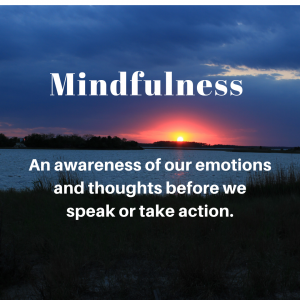
Mindfulness

Description
Mindfulness is living reflectively, with conscious awareness of our actions, words, and thoughts. Awake to the world around us, we fully experience our senses. We are attentive to others’ needs. We refuse to rush. Living mindfully lightens our lives by helping us to detach from our emotions. We transform anger to justice. We seek joy instead of mere desire. We cultivate our inner vision, aware of life’s lessons as they unfold. Mindfulness brings us serenity.
In Family Life
The virtue of mindfulness within a family is a beautiful tapestry woven with conscious awareness, where each member lives reflectively, fully embracing the essence of their interconnected existence. It is the art of being present in the moment, attentively listening to one another’s needs, and savoring the richness of shared experiences through heightened senses.
In the family, rushing is replaced by deliberate, thoughtful actions, and emotions are transformed into a source of insight and justice rather than impulsive reactions. Mindfulness becomes the compass guiding them towards joy, steering away from mere desire. It’s a continuous journey of inner growth, where they learn life’s invaluable lessons as a collective, fostering serenity, unity, and a deep appreciation for the precious moments they share.
Quote
“Can you cleanse your inner vision until you see nothing but the light?…Can you step back from your own mind and thus understand all things?”
— Tao Te Ching
The Practice of Mindfulness
- I seek always to be awake and aware.
- I am considerate of the needs of others.
- I keep a pace of grace.
- I do not allow emotions and impulse to rule me.
- I cultivate my spiritual awareness with daily reflection.
- I am a lifelong learner.
Balancing Mindfulness
Mindfulness is a virtue that, when practiced in moderation, brings serenity, self-awareness, and empathy into our lives. When taken to extremes in either direction, it can lead to excessive self-criticism or impulsiveness. To balance the virtue of mindfulness in our lives, consider these virtues.
- Compassion: Balancing mindfulness with compassion helps individuals remain kind and understanding towards themselves and others. It encourages a gentler approach to self-reflection and self-improvement.
- Flexibility: Flexibility allows individuals to adapt mindfully to different situations, acknowledging that perfection in mindfulness is not always attainable or necessary.
- Patience: Patience helps individuals slow down and think before acting, promoting more thoughtful and mindful decision-making.
- Empathy: Cultivating empathy enables individuals to connect with others more deeply, understanding their needs and emotions.
We can lead more harmonious and fulfilling lives by balancing mindfulness with virtues like compassion, flexibility, patience, and empathy. Self-awareness is the first step toward developing mindfulness. It allows individuals to better understand their thoughts, feelings, and actions.
